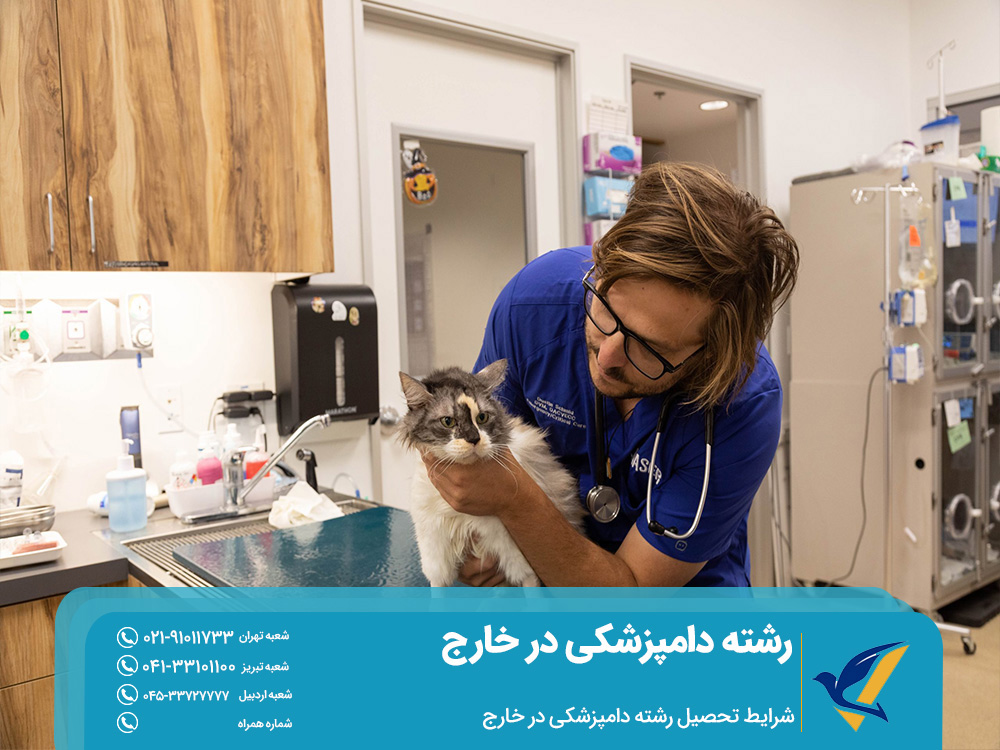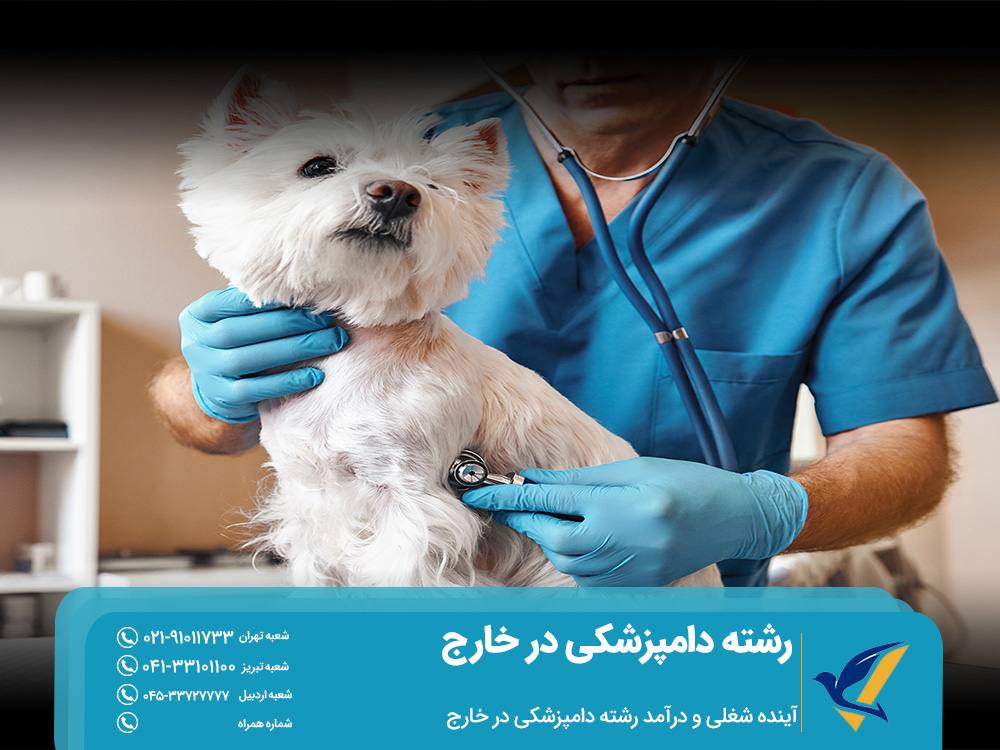Veterinary Medicine Abroad
Veterinary medicine abroad is a field that deals with the health and well-being of animals. Similar to human medicine, this discipline covers everything from preventive care to psychological assessments and complex surgical procedures. Every year, many students compete for admission to the best veterinary schools worldwide to pursue their desired field of study. Studying veterinary medicine abroad is a dynamic, challenging, and valuable experience for students. This field provides both scientific and clinical training in veterinary sciences.
By pursuing this degree, you will gain a comprehensive understanding of veterinary science and research while developing problem-solving, communication, and teamwork skills. Studying veterinary medicine abroad helps you grasp the fundamental biological principles, the normal functions of the body, and various animal diseases. If you are passionate about improving the lives of animals, stay with us until the end of this article from Elm Vira to explore veterinary medicine salaries abroad.
Structure of Veterinary Medicine Abroad
Veterinary medicine abroad, also known as veterinary science, is a branch of medicine that focuses on diseases, disorders, and injuries in animals. Students who choose this field acquire a broad range of clinical skills along with knowledge of animal care. Similar to human medicine, veterinary education follows different systems depending on the country of study.
In some countries, veterinary sciences can be studied at the undergraduate level, while in others, this field is offered as a graduate program. Students may pursue a master’s degree in veterinary medicine after completing a relevant undergraduate program such as biology or animal sciences. Generally, studying veterinary medicine abroad takes about 5 to 6 years and, like human medicine, is in high demand among international students.
Although the structure of veterinary programs may vary by country, they generally follow a similar pattern. The first years of study focus on the structure and function of healthy animals. In the later years, students gain the necessary knowledge and skills to diagnose, treat, and manage diseases that affect animals.

Veterinary Medicine Courses Abroad
Veterinary medicine abroad covers a wide range of animal-related fields, including large and small animal medicine, population health, infectious diseases, and more. Some of the key subjects covered in an undergraduate veterinary program include:
- Principles of Biology
- Practical Skills in Animal Behavior
- Bacteriology
- Virology
- Anatomy
- Parasitology
- Pharmacology
- Physiology
- Toxicology
- Population Ecology and Wildlife Management
- Cells and Genes
- General Pathology and Concepts of Infectious Diseases
- Veterinary Research
- Emerging Diseases, Public Health, and Sustainability
- Zoology
- Animal Physiology and Behavior
Veterinary Medicine Specializations Abroad
Veterinary medicine abroad encompasses a broad range of fields, including animal behavior, and is in high demand due to its connection to public health. Some of the key veterinary specializations at the undergraduate level include:
- Animal Behavior: This field studies the how and why of natural animal behavior, expanding students’ knowledge of wild, domestic, and farm animals.
- Veterinary Biology: This specialization focuses on the scientific principles of biology and animal physiology to understand the mechanisms of health and disease.
- Veterinary Nursing and Animal Behavior: This field includes essential veterinary competencies required for providing practical animal care, along with the necessary skills to work as a veterinary nurse.

Requirements for Studying Veterinary Medicine Abroad
The requirements for studying veterinary medicine abroad can vary depending on the country you choose. However, here are some general conditions for admission to veterinary programs abroad:
To pursue veterinary medicine, it is expected that you have a strong academic background in subjects like biology, chemistry, physics, and mathematics. Additionally, having a high GPA during your high school years can make the admission process easier. Depending on the country, you may need to take an entrance exam to be accepted into the program.
Therefore, it is essential to visit the official website of your chosen university to ensure that you meet their specific conditions. Another factor to consider is language proficiency. Having sufficient language skills in the language of the country (at least in English) can play a crucial role in your admission process. As mentioned earlier, veterinary medicine is a highly competitive field, so having an excellent academic background, recommendation letters, and other academic qualifications can increase your chances of being admitted.
Documents Required for Admission to Veterinary Medicine
The documents required for studying veterinary medicine abroad may vary depending on factors such as the country, university type, and the level of study. However, the general documents required for admission to universities abroad include:
- Application Form
- Identification Documents
- Copy of Passport
- Translated High School Diploma and Transcripts
- Medical Certificate
- HIV Test Results
- Several Passport-sized Photographs
- Language Proficiency Certificate (if applicable)
- Statement of Purpose
- Recommendation Letters
- And more…

Best Countries and Universities for Studying Veterinary Medicine Abroad
Choosing the right country for studying veterinary medicine abroad is one of the most important factors in the process of educational migration. Students need to select a country based on factors such as academic reputation, economic conditions, security, and the quality of universities. After conducting necessary research and evaluating personal circumstances, students can begin their study abroad journey. Here are some of the best countries for studying veterinary medicine abroad:
1. Studying Veterinary Medicine at Top Universities in the United States
International students who choose the United States to study veterinary medicine must possess a high level of English proficiency, along with taking entrance exams such as the GRE (Graduate Record Examination), which is commonly required for entering graduate programs.
The United States, with more than 4,000 universities across the country, is known for its quality education and advanced technologies, earning top ranks among the best universities worldwide. Given the diverse population of the country, institutions of higher education have adapted to accommodate students from all backgrounds.
Degree programs from U.S. universities are recognized globally and hold high credibility. The U.S. has been a leader in many research and academic fields, including biological and medical sciences. Furthermore, the U.S. is home to the largest number of universities in the top 50 veterinary schools worldwide. Some of the best universities in the U.S. for studying veterinary medicine include:
- University of California, Davis
- Cornell University
- Michigan State University
- The Ohio State University
- University of Minnesota Twin Cities
- … and more.

2. Studying Veterinary Medicine in the United Kingdom
The United Kingdom is one of the most popular destinations for international students each year, offering a wide range of academic programs, including veterinary medicine. Universities in the UK are among the best in the world for studying veterinary medicine, consistently ranking high in global rankings. Known for high-quality education and cutting-edge research, UK universities are also renowned for their excellent support systems for international students.
Graduates from UK universities earn degrees with global recognition, opening up exciting career opportunities. Some of the top universities in the UK for studying veterinary medicine include:
- Royal Veterinary College, University of London
- University of Edinburgh
- University of Cambridge
- University of Bristol
- University of Glasgow
… and more.
3. Studying Veterinary Medicine in China
Studying veterinary medicine in China is an excellent option for students interested in international education. China is well-known for its large number of international students and reputable universities. Chinese universities offer a wide range of high-quality programs and have earned global recognition for their academic excellence.
Due to China’s rapidly developing economy, industrial growth potential, and introduction of the latest global technologies, it has become an increasingly popular destination for international students. Many Chinese universities are highly ranked among the best universities in the world. Some of the top universities in China for studying veterinary medicine include:
- Zhejiang University
- Sichuan University
- Jiao Tong University
- Tianjin University
- Harbin University
- China Agricultural University
… and more.

4. Studying Veterinary Medicine in Turkey
Turkey, with its rich history and diverse culture, has become one of the most popular destinations for international students. Studying veterinary medicine in Turkey offers several advantages, including high-quality education and a broad range of academic programs. The Turkish higher education system provides extensive educational opportunities and access to numerous fields of study, making it an ideal place for international students to pursue their academic interests.
Turkey is home to over 200 universities, many of which are ranked highly among global institutions. Degrees from Turkish universities are widely recognized and respected. The country offers modern educational, research, and student support facilities, collaborating with international institutions to provide high-quality learning experiences for students. Some of the best universities in Turkey for studying veterinary medicine include:
- Ankara University
- Istanbul University
- Selçuk University
- Hacettepe University
- Ege University
- Yeditepe University
… and more.
5. Studying Veterinary Medicine in Russia
In recent years, Russia has become an increasingly popular destination for international students. Russian universities are renowned for their academic excellence, particularly in fields such as mathematics, physics, biology, and medicine. Russia’s higher education system is known for producing highly skilled professionals in creative and scientific fields. The country boasts one of the highest literacy rates in the world at 99.6%.
Studying veterinary medicine in Russia is done according to global standards, and Russian universities provide modern facilities and infrastructure, creating an excellent environment for students. Russian degrees are highly respected not only in Europe but also globally. Among the 100 best medical universities worldwide, 30 are located in Russia. Some of the best universities in Russia for studying veterinary medicine include:
- RUDN University (Peoples’ Friendship University of Russia)
- Saratov State Agrarian University
- Lomonosov Moscow State University
- Tomsk University
- Kazan Federal University
- Nizhny Novgorod State Agricultural Academy
… and more.

Future Career and Earnings in Veterinary Medicine Abroad
Graduates of veterinary medicine programs abroad acquire the clinical skills and scientific understanding necessary to enter the veterinary profession and other related fields. Many graduates enhance their clinical skills by pursuing master’s and doctoral degrees, specializing in specific areas of veterinary science or biomedical sciences. This field offers opportunities to enter various veterinary or biotechnological careers. Some of the career options for veterinary graduates abroad include:
- Animal Behavior Specialist
- Veterinarian
- Clinical Manager
- Animal Nutritionist
- Public Sector Veterinarian
- Researcher
- Lecturer
- Veterinary Pharmaceutical Consultant
- Veterinary Pathologist
- Employment in private companies, etc.
According to the Global Salary Report for 2024, the income for veterinarians in various countries is as follows:
- United States: $100,000 – $250,000
- United Kingdom: $44,100 – $90,840
- New Zealand: $49,000 – $110,000
- Australia: $55,500 – $117,000
- Canada: $66,900 – $148,000
- Hong Kong: $127,900 – $230,000
- Ireland: $45,500 – $96,800
- United Arab Emirates: $32,000 – $95,000
- Qatar: $65,000 – $122,000
- South Africa: $20,000 – $59,000
It is important to note that the income of veterinary graduates abroad depends on various factors such as work experience, career field, country’s economic conditions, and more.

Veterinary Medicine Studies in China
Veterinary medicine in China focuses on the prevention and treatment of animal diseases, teaching students how to care for both domestic and farm animals. Studying veterinary medicine abroad in China provides a comprehensive education in animal care, including practical clinical experience. Veterinary medicine is a highly sought-after field in China, attracting many international students every year. Chinese universities offer professional veterinary nursing programs to enhance students’ understanding of animal behavior and care techniques in a professional setting.
The veterinary medicine program is offered at over 150 universities in China. One of the advantages of studying veterinary medicine abroad in China is the availability of English-taught programs. Chinese universities are equipped with state-of-the-art facilities and laboratories, providing a unique learning environment where students can receive top-quality clinical training. The cost of studying veterinary medicine in China varies depending on the university and is estimated to range from [insert estimated amount].
Some of the top universities in China for veterinary studies include:
- China Agricultural University
- South China Agricultural University
- Zhejiang University
- Hong Kong University
- Nanjing Agricultural University
- Huazhong Agricultural University
- Henan Agricultural University
Veterinary Medicine Studies in Russia
In Russia, veterinary students work with farm animals, domestic animals, and a wide variety of birds. The veterinary medicine program in Russia provides students with both theoretical and practical knowledge on preventative care, medical procedures, vaccinations, animal birth management, and advising pet owners. Veterinary education in Russia integrates advanced educational technologies to cultivate personal and professional competencies in students.
Veterinary medicine is available at the undergraduate, master’s, and doctoral levels in Russia, with a bachelor’s degree taking approximately 5 to 6 years. Russian universities are highly ranked globally and offer internationally recognized education. For students who are not proficient in the Russian language, many universities offer English-taught programs and preparatory language courses.
The cost of studying veterinary medicine in Russia ranges from $3,200 to $5,000 per year, depending on whether the university is public or private and the city in which the student studies.
Some of the top veterinary universities in Russia include:
- RUDN University (Peoples’ Friendship University of Russia)
- Lomonosov Moscow State University
- St. Petersburg State University
- Kazan Federal University
- Nizhny Novgorod State Agricultural University
- Moscow State University
- Ural Federal University
These programs offer high-quality veterinary education, equipping graduates with the skills necessary for successful careers in animal healthcare.

Veterinary Medicine Studies in Turkey
Veterinary medicine in Turkey is designed to provide students with scientific education, equipping them with the skills needed to work in animal production, care for domestic animals, poultry, cattle, sheep, and fish, and provide medical services. Turkey offers a cost-effective education and living experience, making it an excellent destination for studying veterinary medicine abroad.
Studying veterinary medicine in Turkey comes with several benefits, including scholarship opportunities. With numerous universities offering programs in this field, the ability to study in English, and affordable educational and living facilities, Turkey has become one of the most popular destinations for international students. A total of 28 universities in Turkey offer veterinary medicine programs.
The veterinary medicine program in Turkey lasts 5 years, consisting of 10 semesters. During this period, students gain clinical education through advanced clinics and laboratories. The cost of studying veterinary medicine in Turkey ranges from $3,000 to $4,500 per year, depending on the university and language of instruction.
Some of the top universities for veterinary studies in Turkey include:
- Ankara University
- Hacettepe University
- Istanbul University
- Fırat University
- Atatürk University
- Selçuk University
Summary
Veterinary medicine abroad is a field that focuses on treating a wide range of animals, from pets to farm animals, covering subjects like animal anatomy and behavior. Similar to human medicine, this discipline emphasizes health and diseases of animals. Veterinary education abroad combines practical and theoretical training, providing students with the necessary skills across diverse areas.
Top veterinary universities worldwide offer unique educational opportunities in an international environment. Given the potential income in the veterinary field abroad, many students pursue education with the goal of migration and employment overseas. If you are also considering studying abroad, feel free to reach out to our consultants at Elm Vira Immigration Institute for guidance on choosing the best path. For more information and free consultation, please visit our advisory section.
میانگین امتیازات 5 از 5
Vote count: 1 Vote